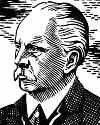|
A Radio Talk by Charles F. Kettering  Before our modern scientific age came into being, this tying
together of different types of knowledge was done as a rule by people
who were educated in one field and through choice or force of
circumstances worked in another. One of the outstanding men of this
class was Hermann Von Helmholtz
who lived more than a century ago and
brought together physiology, music and physics.
Before our modern scientific age came into being, this tying
together of different types of knowledge was done as a rule by people
who were educated in one field and through choice or force of
circumstances worked in another. One of the outstanding men of this
class was Hermann Von Helmholtz
who lived more than a century ago and
brought together physiology, music and physics.Helmholtz was born in Potsdam, Germany in 1821. His father was an eminent teacher and his son received an excellent education in medicine and surgery. After practicing medicine for a while, young Helmholtz taught anatomy in Berne and then physiology in several of the best universities, including Konigsberg. What is still more important, in the latter part of his life he became professor of physics in the University of Berlin where he made great contributions to the physiological effect of sound and light. |








